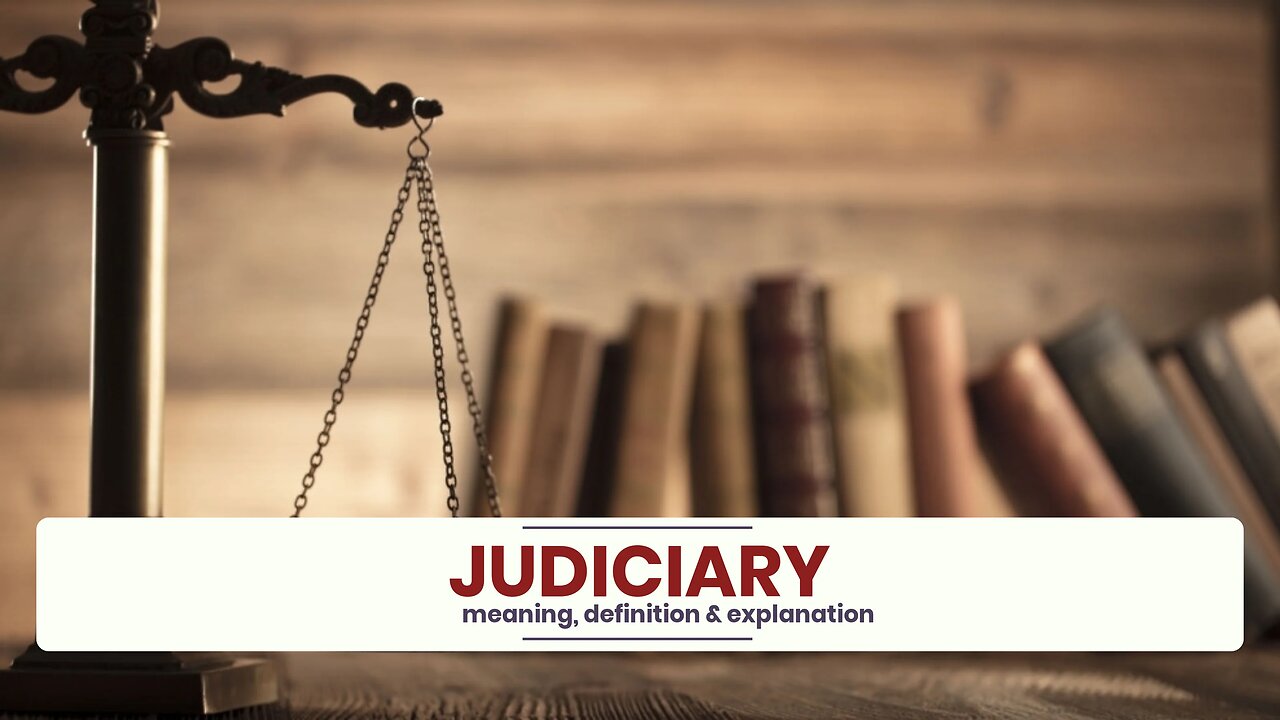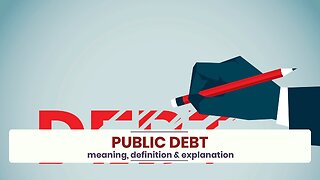Premium Only Content

What is JUDICIARY?
✪✪✪✪✪
http://www.theaudiopedia.com
✪✪✪✪✪
What does JUDICIARY mean? JUDICIARY meaning - JUDICIARY definition - JUDICIARY explanation. What is the meaning of JUDICIARY? What is the definition of JUDICIARY? What does JUDICIARY stand for? What is JUDICIARY meaning? What is JUDICIARY definition?
The judiciary (also known as the judicial system or court system) is the system of courts that interprets and applies the law in the name of the state. The judiciary also provides a mechanism for the resolution of disputes. In some nations, under doctrines of separation of powers, the judiciary generally does not make law (which is the responsibility of the legislature) or enforce law (which is the responsibility of the executive), but rather interprets law and applies it to the facts of each case. In other nations, the judiciary can make law, known as Common Law, by setting precedent for other judges to follow, as opposed to Statutory Law made by the legislature. The Judiciary is often tasked with ensuring equal justice under law.
In many jurisdictions the judicial branch has the power to change laws through the process of judicial review. Courts with judicial review power, may annul the laws and rules of the state when it finds them incompatible with a higher norm, such as primary legislation, the provisions of the constitution or international law. Judges constitute a critical force for interpretation and implementation of a constitution, thus de facto in common law countries creating the body of constitutional law. For a people to establish and keep the 'Rule of Law' as the operative norm in social constructs great care must be taken in the election and/or appointment of unbiased and thoughtful legal scholars whose loyalty to an oath of office is without reproach. If law is to govern and find acceptance generally courts must exercise fidelity to justice which means affording those subject to its jurisdictional scope the greatest presumption of inherent cultural relevance within this framework.
In the US during recent decades the judiciary became active in economic issues related with economic rights established by constitution because "economics may provide insight into questions that bear on the proper legal interpretation". Since many countries with transitional political and economic systems continue treating their constitutions as abstract legal documents disengaged from the economic policy of the state, practice of judicial review of economic acts of executive and legislative branches have begun to grow.
In the 1980s, the Supreme Court of India for almost a decade had been encouraging public interest litigation on behalf of the poor and oppressed by using a very broad interpretation of several articles of the Indian Constitution.
Budget of the judiciary in many transitional and developing countries is almost completely controlled by the executive. The latter undermines the separation of powers, as it creates a critical financial dependence of the judiciary. The proper national wealth distribution including the government spending on the judiciary is subject of the constitutional economics. It is important to distinguish between the two methods of corruption of the judiciary: the state (through budget planning and various privileges), and the private.
The term "judiciary" is also used to refer collectively to the personnel, such as judges, magistrates and other adjudicators, who form the core of a judiciary (sometimes referred to as a "bench"), as well as the staffs who keep the system running smoothly.
In some countries and jurisdictions, judiciary branch is expanded to include additional public legal professionals and institutions such as prosecutors, state lawyers, ombudsmen, public notaries, judicial police service and legal aid officers. These institutions are sometimes governed by the same judicial administration that governs courts, and in some cases the administration of the judicial branch is also the administering authority for private legal professions such as lawyers and private notary offices.
-
 1:41
1:41
The Audiopedia
8 months agoWhat is PUBLIC DEBT?
53 -
 1:31:20
1:31:20
Flyover Conservatives
1 day agoUS STOCK MARKET: Sinking Ship - Dr. Kirk Elliott; How I Fought Back Against Woke Schools & Stopped Gender Bathrooms - Stacy Washington | FOC Show
78.6K4 -
 1:08:09
1:08:09
Donald Trump Jr.
16 hours agoFBI Dream Team, Plus Taking Your Questions Live! | Triggered Ep.219
220K288 -
 7:32:37
7:32:37
Akademiks
15 hours agoDrake and PartyNextDoor '$$$4U' Album Sells 250K first week. BIG AK IS BACK.
132K19 -
 3:12:08
3:12:08
MyronGainesX
14 hours ago $33.46 earnedDan Bongino Named FBI Deputy Director, Trump Meets Macron, And More!
107K32 -
 3:12:31
3:12:31
vivafrei
14 hours agoBarnes Live from Seattle - Defending Benshoof in a Case that is CRAY CRAY!
193K55 -
 2:12:12
2:12:12
Robert Gouveia
14 hours agoLiberals EXPLODE over Elon's Email; Lawsuits FLY; Sanctions?? Congrats Dan!
134K79 -
 1:33:36
1:33:36
Redacted News
15 hours agoBREAKING! PUTIN LAUNCHES MASSIVE OFFENSIVE IN UKRAINE AS EUROPEAN LEADERS PUSH FOR MORE WAR
207K282 -
 44:39
44:39
Kimberly Guilfoyle
15 hours agoBetter Days Ahead for the FBI, Live with Asm Bill Essayli & John Koufos | Ep.199
131K34 -
 1:40:29
1:40:29
In The Litter Box w/ Jewels & Catturd
1 day agoWhat Did You Do Last Week? | In the Litter Box w/ Jewels & Catturd – Ep. 748 – 2/24/2025
164K70